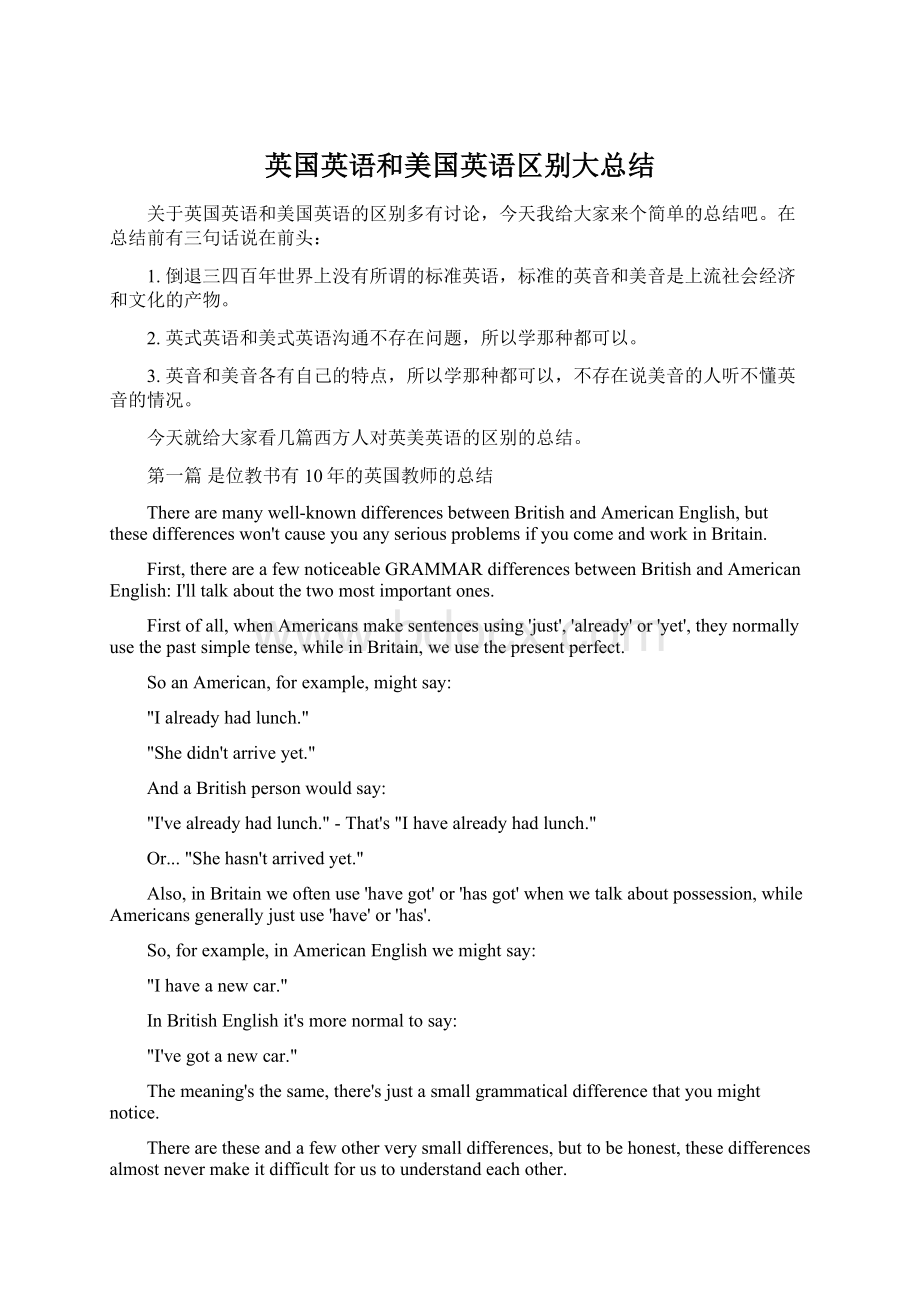英国英语和美国英语区别大总结.docx
《英国英语和美国英语区别大总结.docx》由会员分享,可在线阅读,更多相关《英国英语和美国英语区别大总结.docx(11页珍藏版)》请在冰豆网上搜索。

英国英语和美国英语区别大总结
关于英国英语和美国英语的区别多有讨论,今天我给大家来个简单的总结吧。
在总结前有三句话说在前头:
1.倒退三四百年世界上没有所谓的标准英语,标准的英音和美音是上流社会经济和文化的产物。
2.英式英语和美式英语沟通不存在问题,所以学那种都可以。
3.英音和美音各有自己的特点,所以学那种都可以,不存在说美音的人听不懂英音的情况。
今天就给大家看几篇西方人对英美英语的区别的总结。
第一篇是位教书有10年的英国教师的总结
Therearemanywell-knowndifferencesbetweenBritishandAmericanEnglish,butthesedifferenceswon'tcauseyouanyseriousproblemsifyoucomeandworkinBritain.
First,thereareafewnoticeable GRAMMAR differencesbetweenBritishandAmericanEnglish:
I'lltalkaboutthetwomostimportantones.
Firstofall,whenAmericansmakesentencesusing 'just', 'already' or 'yet',theynormallyusethepastsimpletense,whileinBritain,weusethepresentperfect.
SoanAmerican,forexample,mightsay:
"I alreadyhad lunch."
"Shedidn'tarriveyet."
AndaBritishpersonwouldsay:
"I'vealreadyhad lunch." -That's "Ihavealreadyhad lunch."
Or... "She hasn't arrived yet."
Also,inBritainweoftenuse 'havegot' or 'hasgot' whenwetalkaboutpossession,whileAmericansgenerallyjustuse 'have' or 'has'.
So,forexample,inAmericanEnglishwemightsay:
"Ihaveanewcar."
InBritishEnglishit'smorenormaltosay:
"I'vegotanewcar."
Themeaning'sthesame,there'sjustasmallgrammaticaldifferencethatyoumightnotice.
Therearetheseandafewotherverysmalldifferences,buttobehonest,thesedifferencesalmostnevermakeitdifficultforustounderstandeachother.
Ontheotherhand,thedifferencesin VOCABULARY betweenAmericanEnglishandBritishEnglisharestrongerthanthegrammaticaldifferences,butagain,theseveryrarelycauseseriousproblems.
Alotofthewordswhicharedifferentareinformalorslangwords...
Forexample,IthinkmanyAmericanswouldbeunfamiliarwiththeBritishslangword 'naff',whichmeans'un-cool'or'poor-quality'.
Ontheotherhand,aBrit(aBritishperson)mightbeveryconfusedbyasentencelike:
"Thecaféiskitty-cornertothepharmacy."
Thismeansthatthecaféisdiagonallyoppositetothepharmacy,butwedon'thavetheword'kitty-corner' inBritishEnglish.
Anotherexamplewouldbetellingthetime...
Ifwewanttodescribe 2:
45 inBritain,wemightsay:
"Quarter to three",or 3:
15 wouldbe"Quarter past three".
Ontheotherhand,inAmerica,thesemightbe:
"Quarter of three"for 2:
45,or"Quarter after three"for 3:
15.
It'sanothersmalldifference,butit'sonethat'snotgoingtocauseseriousproblems-it'squiteeasytogetusedto.
Therearealsosomedifferencesin SPELLING whichIshouldmention.
Oneexampleofthisistheverb 'topractise':
InBritishEnglish,thisisspeltwithan 'S',sothat's
P-R-A-C-T-I-S-E.
InAmericanEnglish,it'sspeltwithtwo 'C's,soinAmericanEnglishit's
P-R-A-C-T-I-C-E.
Andtherearelotsofotherexamplesofslightdifferenceofspelling,butabout99%ofthetime,BritishandAmericanpeoplecanunderstandeachotherwithoutanytroubleatall.InBritainwewatchlotsofAmericanfilmsandTVprograms,andwelistentolotsofAmericanmusic,soAmericanEnglishisgenerallyveryfamiliartous.
ThisisprobablynotquitesotrueforanAmericancomingtoBritain.Americans,Ithink,don'twatchquitesomuchBritishTVorBritishmovies.
IshouldalsopointoutthatregionalEnglishcanbeanimportantthingtothinkabout.NoteveryoneinBritaintalkslikeJamesBond.TherearesomeregionalaccentsinBritainwhichyoudon'thearsoofteninthemovies,andthesemightbeabitmoredifficulttogetusedto.
However,I'dliketofinishbysayingthatmany,manyAmericansliveandworkinBritain,andtheydon'thaveanyseriouslanguageproblemsatall.So,Brittney,myadvicetoyouis:
don'tworryaboutthelanguage,you'llbefine!
第二篇关于两种拼写牛津在线词典给了详细的说明
BritishandAmericanspelling
ThereareseveralareasinwhichBritishandAmericanspellingaredifferent.Thesearethemainonestobeawareof.
Wordsendingin–re
BritishEnglishwordsthatendin -re oftenendin -er inAmericanEnglish:
British
US
centre
center
fibre
fiber
litre
liter
theatre
theater or theatre
Wordsendingin-our
BritishEnglishwordsendingin -our usuallyendin -or inAmericanEnglish:
British
US
colour
color
flavour
flavor
humour
humor
labour
labor
neighbour
neighbor
Wordsendingin-izeor-ise
VerbsinBritishEnglishthatcanbespelledwitheither -ize or -ise attheendarealwaysspelledwith -ize attheendinAmericanEnglish:
British
US
apologize or apologise
apologize
organize or organise
organize
recognize or recognise
recognize
Wordsendingin-yse
VerbsinBritishEnglishthatendin -yse arealwaysspelled -yze inAmericanEnglish:
British
US
analyse
analyze
breathalyse
breathalyze
paralyse
paralyze
Wordsendinginavowelplusl
InBritishspelling,verbsendinginavowelplus l doublethe l whenaddingendingsthatbeginwithavowel.InAmericanEnglish,the l isnotdoubled:
British
US
travel
travel
travelled
traveled
travelling
traveling
traveller
traveler
fuel
fuel
fuelled
fueled
fuelling
fueling
Wordsspelledwithdoublevowels
BritishEnglishwordsthatarespelledwiththedoublevowels ae or oe arejustspelledwithan e inAmericanEnglish:
British
US
leukaemia
leukemia
manoeuvre
maneuver
oestrogen
estrogen
paediatric
pediatric
NotethatinAmericanEnglish,certainterms,suchas archaeology,keepthe ae spellingasstandard,althoughthespellingwithjustthe e (i.e. archeology)isusuallyacceptableaswell.
Nounsendingwith–ence
Somenounsthatendwith -ence inBritishEnglisharespelled -ense inAmericanEnglish:
British
US
defence
defense
licence
license
offence
offense
pretence
pretense
Nounsendingwith–ogue
Somenounsthatendwith -ogue inBritishEnglishendwitheither -og or -ogue inAmericanEnglish:
British
US
analogue
analog or analogue
catalogue
catalog or catalogue
dialogue
dialog or dialogue
Thedistinctionsherearenothardandfast.Thespelling analogue isacceptablebutnotverycommoninAmericanEnglish; catalog hasbecometheUSnorm,but catalogue isnotuncommon; dialogue isstillpreferredover dialog.
Asidefromspellingdifferences,manyitemsandpracticeshavedifferentnamesinBritishandAmericanEnglish.Toexplorefurther,see BritishandAmericanterms.
第三篇这位老师给了更详细的一个说明
Introduction
SpeakersofAmericanEnglishgenerallyusethepresentperfecttense(have/has+pastparticiple)farlessthanspeakersofBritishEnglish.InspokenAmericanEnglishitisverycommontousethesimplepasttenseasanalternativeinsituationswherethepresentperfectwouldusuallyhavebeenusedinBritishEnglish.Thetwosituationswherethisisespeciallylikelyare:
(i)Insentenceswhichtalkaboutanactioninthepastthathasaneffectinthepresent:
AmericanEnglish/BritishEnglish
∙Jennyfeelsill.Sheatetoomuch.
∙Jennyfeelsill.She'seatentoomuch.
∙Ican'tfindmykeys.Didyouseethemanywhere?
∙Ican'tfindmykeys.Haveyouseenthemanywhere?
(ii)Insentenceswhichcontainthewordsalready,justoryet:
AmericanEnglish/British English
∙A:
Aretheygoingtotheshowtonight?
∙B:
No.Theyalreadysawit.
∙A:
Aretheygoingtotheshowtonight?
∙B:
No.They'vealreadyseenit.
∙A:
IsSamanthahere?
∙B:
No,shejustleft.
∙A:
IsSamanthahere?
∙B:
No,she'sjustleft.
∙A:
CanIborrowyourbook?
∙B:
No,Ididn'treadityet.
∙A:
CanIborrowyourbook?
∙B:
No,Ihaven'treadityet.
1.Verb agreement withcollectivenouns
InBritishEnglishcollectivenouns,(i.e.nounsreferringtoparticulargroupsofpeopleorthings),(e.g.staff,government,class,team)canbefollowedbyasingularorpluralverbdependingonwhetherthegroupisthoughtofasoneidea,orasmanyindividuals,e.g.:
Myteamiswinning.
Theotherteamareallsittingdown.
InAmericanEnglishcollectivenounsarealwaysfollowedbyasingularverb,soanAmericanwouldusuallysay:
Whichteamislosing?
whereasinBritishEnglishbothpluralandsingularformsoftheverbarepossible,asin:
Whichteamis/arelosing?
2.Useof delexical verbshaveandtake
InBritishEnglish,theverbhavefrequentlyfunctionsaswhatistechnicallyreferredtoasadelexicalverb,i.e.itisusedincontextswhereithasverylittlemeaninginitselfbutoccurswithanobjectnounwhichdescribesanaction,e.g.:
I'dliketohaveabath.
Haveisfrequentlyusedinthiswaywithnounsreferringtocommonactivitiessuchaswashingorresting,e.g.:
She'shavingalittlenap.
I'lljusthaveaquickshowerbeforewegoout.
InAmericanEnglish,theverbtake,ratherthanhave,isusedinthesecontexts,e.g.:
Joe'stakingashower.
I'dliketotakeabath.
Let'stakeashortvacation.
Whydon'tyoutakearestnow?
3.Useof auxiliaries andmodals
InBritishEnglish,theauxiliarydoisoftenusedasasubstituteforaverbwhenreplyingtoaquestion,e.g.:
∙A:
Areyoucomingwithus?
∙B:
Imightdo.
InAmericanEnglish,doisnotusedinthisway,e.g.:
∙A:
Areyoucomingwithus?
∙B:
Imight.
InBritishEnglishneedn'tisoftenusedinsteadofdon'tneedto,e.g.:
Theyneedn'tcometoschooltoday.
Theydon'tneedtocometoschooltoday.
InAmericanEnglishneedn'tisveryunusualandtheusualformisdon'tneedto,i.e.:
Theydon'tneedtocometoschooltoday.
InBritishEnglish,shallissometimesusedasanalternativetowilltotalkaboutthefuture,e.g.:
Ishall/willbetherelater.
InAmericanEnglish,shallisunusualandwillisnormallyused.
InBritishEnglishshallI/weisoftenusedtoaskforadviceoranopinion,e